Text
Summary of all mentions of members of Hong Lu's family in the game + comparison with the original book
Summary:
Mention of his “family” in general in the game
Mention of the family elders in the game + comparison with the original work
Mention of his grandmother in the game + comparison with the original work
Mention of his grandfather in the game + comparison with the original work
Mention of his father in the game + comparison with the original work
Mention of his siblings in the game + comparison with the original work
Mention of his brother (Jia Huan) in the game
I wanted to recap all the times Hong Lu talks about his family or a particular member of his family while at the same time comparing them to their version of the original novel by giving some info on the latter (assuming that Hong Lu = Jia Baoyu ). I excluded from this list the uncles and aunts by marriage as well as Baoyu's cousins for various reasons (too long otherwise, not mentioned...) but I will perhaps do a part 2 to talk about them.
Was also excluded, the entire branch which stems from Jia Yan (the brother of Jia Yuan (the father of Jia Daishan, the husband of Grandmother Jia)), a branch which remains important since it is this one who leads to the actual Head of the Ningguo Mansion (Jia Zhen) when the story takes place. But since, they are distant relatives/cousins of Jia Baoyu, that was taking me too far and so I had to remove them from this list. But I still wanted to mention it since it is an important branch of the family
The Jia family is mainly composed of 4 great families: the Jia Family, the Xue Family, the Wang Family and the Shi family in other words those who were born with the name Jia and those who joined the family by marriage / alliance / by being the brother / sister of one of the grooms… (born Xue or Wang or Shi).
There are also other families like the Xing or Lin family joining the Jia family but whose name appears (very) less often and which are also not considered as one of the great families of the novel.
This list of family members is made in relation to the place they occupy in relation to Jia Baoyu.
I/Mention of his “family” in general in the game
LCB sinner, chatter#3
Abn. logs, Pink shoes: lacking data
Abn. Logs, Sign of Roses: level 1
Abn. Logs, Sign of Roses: level 3
Liu Association South Section 5, story
Liu Association South Section 5, story
K Corp. Class 3 excision staff, post-uptie chat 2
W Corp. L2 Cleanup agent, Idle
Main story, Canto II, episode: 3
Detour Tales, Chapter 5.5, Miracle in district 20, episode: 13
Main story, Canto V, episode: 2
Hong Lu’s promo pre-limbus company release (Hong Lu also mentions the family’s chef’s side dishes but I didn’t include it because it was not about his family specifically)
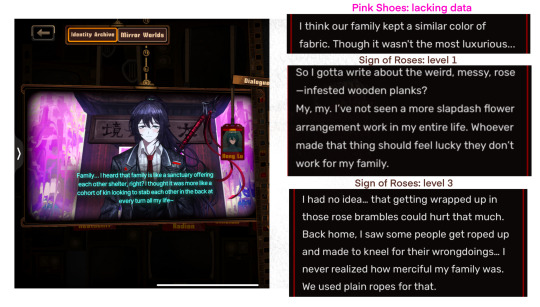
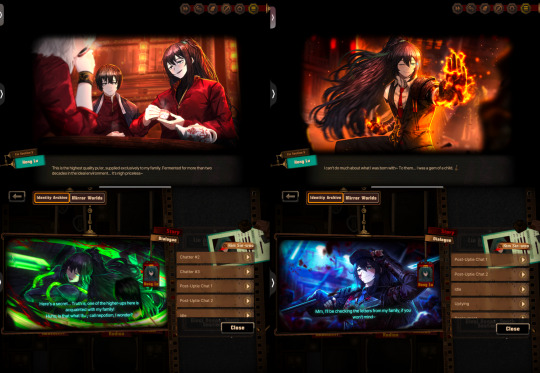
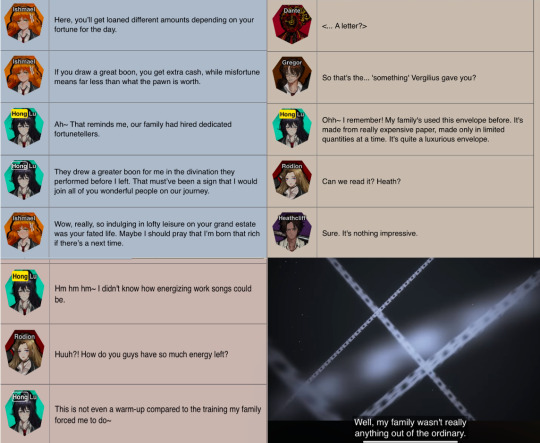
II/Mention of the family elders in the game + comparison with the original work
W Corp. L2 Cleanup agent, story
W Corp. L2 Cleanup agent, story
Main story, Canto IV, episode: 27
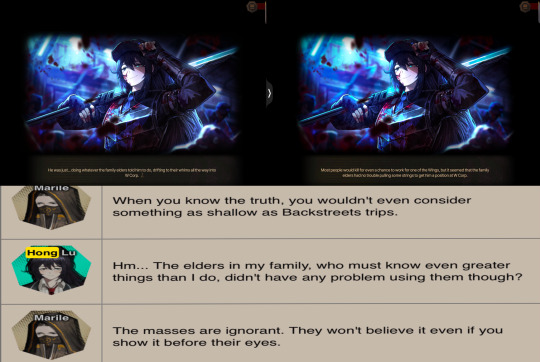
To tell the truth, I don't really know what the term "elders" is supposed to encompass in this context in the sense that, I don't know whether or not parents and/or uncles/aunts should be included in addition to the grandparents.
In my opinion the term "elders" refers to all the generations who are above the one who uses this term (in this case Hong Lu / Jia Baoyu) so I would tend to want to count the parents and uncles / aunts but I cannot say this with certainty.
I will therefore base myself on my interpretation so that it will allow me to talk about more characters of the novel but do not hesitate to let me know what this term encompasses!
1st generation:
Grand parents:
Jia Daishan:
Son of Jia Yuan
first Duke of Rong
husband of Grandmother Jia
father of Jia She, Jia Min and Jia Zheng
grandfather of the three first Spring Ladies (Jia Yuanchun, Jia Tanchun and Jia Yingchun), Jia Zhu, Baoyu, Daiyu, Jia Huan, Jia Lian
died before the beginning of the novel, reason why we don’t know much about him
Grandma Jia (the Dowager):
Daughter of the Marquis Shi of Jinling
Wife of Jia Daishan
Grandmother Jia is a generation above the oldest member of the Rongguo Mansion (Jia Jing)
Thus, members of the Jia family all defer to her
For further information, refer to the paragraph dedicated to her below
Great uncle(s):
Dowager’s brother:
We don't know much about the Dowager's brother
He is Grandmother Jia’s brother
He is the father of Shi Ding and Shi Xiangyun's Father
He is Shi Xiangyun’s grandfather
died before the beginning of the novel, reason why we don’t know much about him
2nd generation:
Parents:
Jia Zheng:
Jia Zheng is the second and youngest son of Jia Daishan and Grandmother Jia.
He has a wife, Lady Wang, and two concubines: Zhao (with whom he had two children) and Zhou
For further information, refer to the paragraph dedicated to him below
Lady Wang:
Daughter of one of the four most prominent families of Jinling (Wang)
Primary wife of Jia Zheng
Mother of Baoyu and Yuanchun
Because of her purported ill-health, she hands over the running of the household to her niece, Wang Xifeng
In the eyes of her servants, she appears as a statue of a lifeless Buddha.
Although generous, she is described as without will or conviction.
Lady Wang seems kind and caring but can be cruel and ruthless when her authority is questioned.
She shows excessive concern about her son Baoyu's romantic relationships and closely monitors his maids.
Lady Wang plays a role in the death of Baoyu's maid, Qingwen, due to her suspicion and cruelty toward maids she perceives as threats to her son's virtue.
Uncles:
Jia She:
Elder son of the Dowager
Big brother of Jia Zheng and Jia Min
Husband of Xing furen
He has 2 concubines: Yingchun’s mother and Jia Cong's mother
Father of Jia Lian, Jia Yingchun and Jia Cong
He inherited the title of Marquis Rong
He is treacherous and greedy, as well as seductive/woomanizer.
He feels jealous towards his younger brother, favored by their mother.
He was later stripped of his title and banished by the government.
Father of Wang Ren and Wang Xifeng:
Lady Wang’s brother
Also brother of Wang Ziteng and Wang Zisheng
Father of Wang Ren and Wang Xifeng:
Wang Ziteng:
Lady Wang’s brother
Also brother of Wang Xifeng’s father and Wang Zisheng
Wang Zisheng:
Lady Wang’s brother
Also brother of Wang Xifeng’s father and Wang Ziteng
Aunts:
Jia Min:
Daughter of Jia Daishan and Grandmother Jia
Sister of Jia She and Jia Zheng
Wife of Lin Ruhai
Mother of Lin Daiyu
Xue Yima also known as Aunt Xue:
Sister of Lady Wang
Sister of Wang Ziteng, Wang Zisheng and Wang Xifeng’s father
Mother to Xue Pan and Xue Baochai
She is generally kind and affable.
However, she struggles to control her rambunctious son.
III/ Mention of his grandmother in the game + comparison with the original work
K Corp. Class 3 excision staff, story
K Corp. Class 3 excision staff, story
K Corp. Class 3 excision staff, story
K Corp. Class 3 excision staff, story
W Corp. L2 Cleanup agent, chatter #1
K Corp. Class 3 excision staff, post-uptie chat 1
Detour Tales, Chapter 5.5, S.E.A, episode: 4
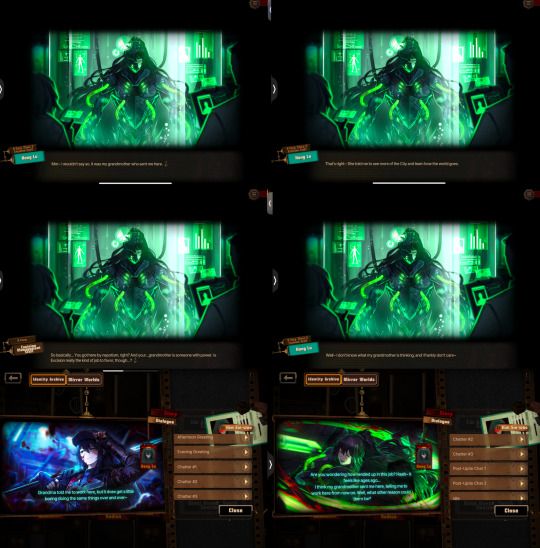
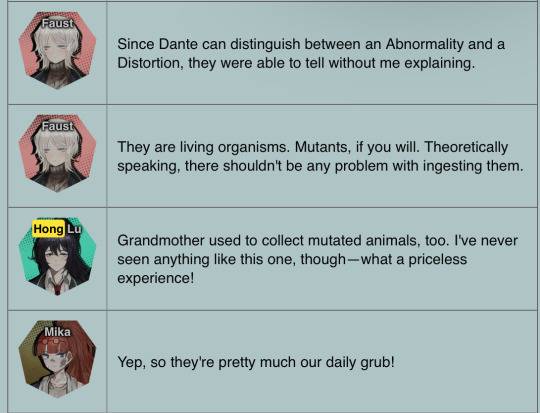
If Hong Lu is indeed the equivalent of Jia Baoyu in the world of limbus company, Hong Lu's grandmother should be the one known as Grandmother Jia, née Shi:
Grandmother Jia:
Also called Dowager Shi or simply the Dowager
She is the daughter of the Marquis Shi of Jinling
Grandmother Jia is a generation above the oldest member of the Rongguo Mansion (Jia Jing)
Main elder of the great family, she is the oldest and most respected authority of the Jia Clan
Of an enjoyable temperament, she does not intervene in the private lives of her children provided that they do not disturb her, even if they have become debauched or high rollers.
It was she who arranged for Daiyu, her only "outside" (i.e., maternal) grandchild, to come to the Rongguo Mansion
She spoils her grandson Baoyu whom she carries in adoration
Despite this, she does not approve of his love for Daiyu
She is the one who supports the marriage arranged by Sister Pheonix (Wang Xifeng) between Baoyu and Baochai
She will die at the ripe old age of 83
Maybe it's just me, but she seems to be one of the people if not the person who pays the most attention to Jia Baoyu's jade, reminding him to take care of it, asking him if he knows where it is his jade when he is not wearing it, paying attention to the stone...
IV/ Mention of his grandfather in the game + comparison with the original work
Detour Tales, Chapter 5.5, Yield my flesh to claim their bones, episode: 4
Abn. Logs, Pink shoes: lacking data
Hong Lu’s promo pre-limbus company release (yéyé" (爷爷) meaning "grandfather" or “grandpa”. It is an affectionate term used to refer to one's grandfather in Mandarin.)
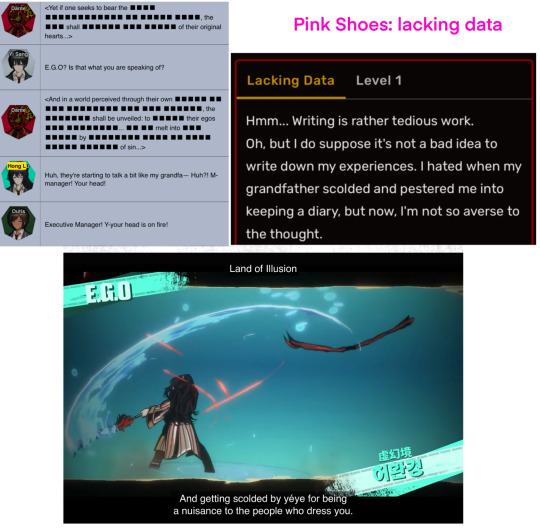
So we don’t really know which of his two grandfathers Hong Lu is referring to but knowing that in the novel only his paternal grandfather is mentioned and died before the novel begins, I think the "grandfather" Hong is talking about is Jia Daishan (and that he probably died in the world of Limbus Company too)
Jia Daishan:
Son of Jia Yuan
first Duke of Rong
husband of Grandmother Jia
father of Jia She, Jia Min and Jia Zheng
grandfather of the three first Spring Ladies (Jia Yuanchun, Jia Tanchun and Jia Yingchun), Jia Zhu, Baoyu, Daiyu, Jia Huan, Jia Lian
died before the beginning of the novel, reason why we don't know much about him
V/ Mention of his father in the game + comparison with the original work
LCB sinner, chatter#1
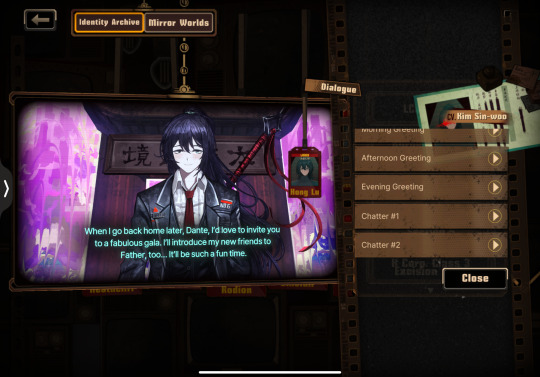
If Hong Lu is indeed the equivalent of Jia Baoyu in the world of limbus company, Hong Lu's father should be Jia Zheng:
Jia Zheng:
He is the second and youngest son of Jia Daishan and Grandmother Jia.
He has a wife, Lady Wang, and two concubines: Zhao (with whom he had two children) and Zhou
Father of Jia Zhu (deceased), Jia Yuanchun, Jia Baoyu, Jia Tanchun and Jia Huan
Confucianism had a great influence on him: he is a Confucian scholar who tries to be an upright and decent person, he fulfills his duties of filial piety towards the Dowager, and wants to educate his children strictly
Afraid his one surviving heir will turn bad, he imposes strict rules on his son (Jia Baoyu), and uses occasional corporal punishment.
Jia Baoyu is afraid of him
He has the ambition to become a good civil servant
But he lacks experience and is easily deceived by others, which earns him a bad reputation.
VI/ Mention of his siblings in the game + comparison with the original work
Main story, Canto III, episode: 2
Detour Tales, Chapter 5.5, episode: 13
Abn. Logs, Pink shoes: lacking data
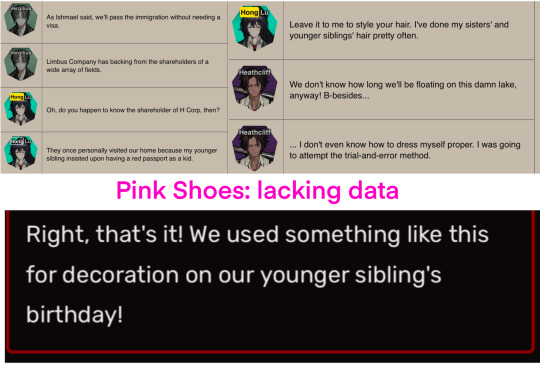
If Hong Lu is indeed supposed to be the Jia Baoyu of the world of Limbus Company, then, if we refer to the novel The Dream of the Red Room, Hong Lu should, like Baoyu, have 4 siblings:
Jia Zhu:
First son of Jia Zheng and Lady Wang
Big brother of Jia Baoyu and Jia Yuanchun and half-brother of Jia Tanchun and Jia Huan since they share the same father.
In the original novel, Jia Zhu is already dead prior to the action of the novel, so we know very little about him.
He had a son (Jia Lan) with Li Wan
Jia Yuanchun:
First female family member of the quartet of "Springs", first daughter of Jia Zheng and Lady Wang
Big sister of Jia Baoyu and Jia Yuanchun and half-sister of Jia Tanchun and Jia Huan since they share the same father.
She is about 10 years older than Baoyu.
She was raised by her grandmother
As an older sister, she taught Baoyu to read and write when he was liitle like his mother would have done.
Originally one of the ladies-in-waiting in the imperial palace, Yuanchun is later promoted to the highest ranking of imperial concubine "Xiande”, having impressed the Emperor with her virtue and intellect.
Despite her prestigious position, Yuanchun feels imprisoned within the four walls of the imperial palace.
She died at the age of forty, following an illness, in total isolation.
Jia Tanchun:
Third female family member of the quartet of "Springs", second daughter of Jia Zheng and his concubine, concubine Zhao
Big sister of Jia Huan and younger half-sister of Jia Zhu, Jia Yuanchun and Jia Baoyu since they share the same father.
The fact that she is the daughter of a concubine is still such a burden that she often claims Lady Wang, Baoyu's mother, as her own
Tanchun is a very clever and capable person, as much as Sister Phoenix for comparison
But, as the proverb says, "he who comes last will have fewer opportunities than the others", and this is what happened to her, because when her family declined she had not done much and she was sent to a distant region following an arranged marriage
Jia Huan:
Third son of Jia Zheng and his concubine, concubine Zhao
Little brother of Jia Tanchun and younger half-brother of Jia Zhu, Jia Yuanchun and Jia Baoyu since they share the same father.
More info just below
VII/ Mention of his brother (Jia Huan) in the game
Main story, Canto I, episode: 30
Main story, Canto V, episode: 18 (there we don’t know if he is talking about Jia Huan or not but there are not many other options and from what we can deduce from Jia Huan’s behaviour (in game and in the book too) it’s not very out off character)
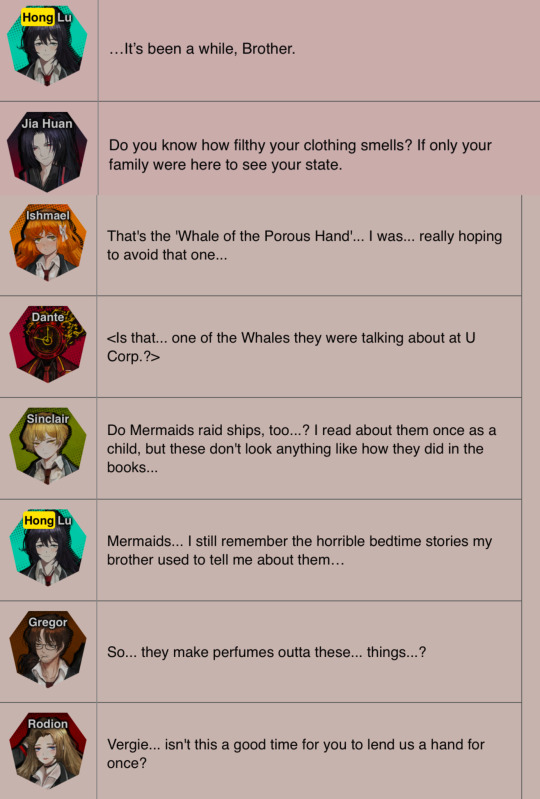
Jia Huan:
Third male family member of the generation of the Jia household, son of Jia Zheng and his concubine, concubine Zhao
Little brother of Jia Tanchun and half-brother of Jia Zhu, Jia Yuanchun and Jia Baoyu since they share the same father.
He is described as ugly and clumsy
He and his mother are both reviled by the family, and he carries himself like a kicked dog.
He is very cunning but mediocre, he shows his malignant nature by spilling candle wax, intending to blind his half-brother Baoyu
That’s all! If I have forgotten any moments where Hong Lu talks about his family, don't hesitate to tell me and I will add it! Also, I tried to verify and proof-read all the info and everything should be correct but if I made a mistake feel free to point it out to me :)
#limbus company#hong lu lcb#project moon#dream of the red chamber spoilers#tw: blood#tw: mentions of abuse#not an analysis but how could I call that#a database??
37 notes
·
View notes
Text

{It’s like burning…}
[Click for better quality]
#magic kaito#aoko nakamori#kuroba kaito#not perfect but I really wanted to post it#with the incoming release of the detective conan’s movie#I am so happy that Aoko gets to be in it#of course the idea comes from this tweet which invited us to draw#this image from the manga Veil#scene 14#you know which one#and so it invited us to draw ship#so here it is#kaiao#to celebrate movie 27 and the return of Aoko on screen!#my art#fan art#kaito kid
108 notes
·
View notes
Text
Let’s talk about Hong Lu’s poster
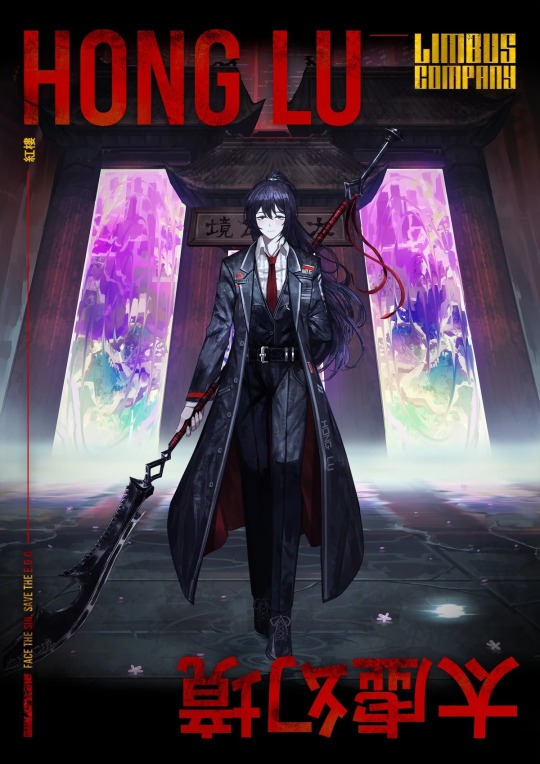
Summary:
Introduction
The paifang
Where is Hong Lu?
The reality of Hong Lu
{Skip the introduction if you’re only interested in the analysis of the character of Hong Lu and his poster}
I/ Introduction
Today I would like to offer you an analysis of Hong Lu's character poster. Although it is difficult to know what these character posters seek to show, apart from presenting characters, it is clear that each of them possesses clues about the sinners’ past and especially where the character represented comes from.
For example, we could see the pallid whale destroying the Pequod on Ishmael's poster, although it was easy to make the connection with Moby Dick, the poster also showed us that Ishmael had a history with a white whale and was a survivor of a shipwreck.
I am not sure if all the information is equally valuable according to the posters because, for example, Sinclair's poster is quite enigmatic and does not really show a specific event or place, or at least I do not recognize it.
But that does not stop me from believing that what is depicted behind the sinners is supposed to be related to the sinner, yes, but also, I think, related to a wing or place in the city that was important in the sinner's past.
I even wonder if the moment/place represented is not supposed to represent the place where the sinner decided to join the company.
Why do I say this? Well, you can see behind Rodion's character a casino setting, whereas her ego and space generated by the golden bough were affiliated with a world of ice. So why does Rodion's poster show her in front of an environment reminiscent of a casino? Perhaps it is to evoke her love for gambling as well as her ability to bluff and her desire for money, but if we look at Rodion's photo in the identity archive menu:

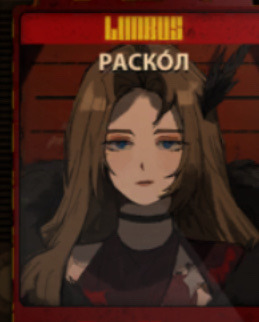
We can see Rodion in an outfit we have never seen her in before, an outfit that closely resembles what someone might wear at a casino. We have never seen how Rodion was recruited by Limbus Company, but if we follow the logic I just proposed, Rodion would have been recruited in a casino.
This logic seems credible and yet doubtful when we look at the case of Yi-sang.
For the moment, Yi-Sang is the only sinner whose recruitment by Limbus Company we know:
We know he was coming out of the laboratory where he was held by Gubo, the same laboratory we can see behind him on his poster.
But here's the catch: this is how Yi-sang was dressed when he met Faust VS versus what Yi-sang looks like on his photo in the identity archive:
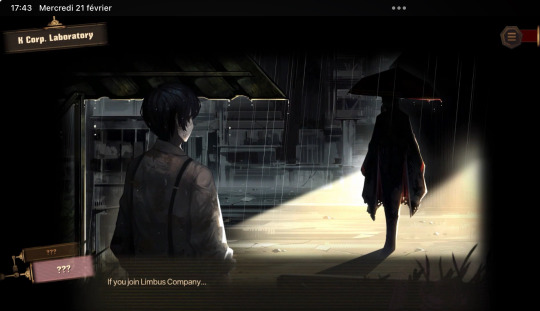
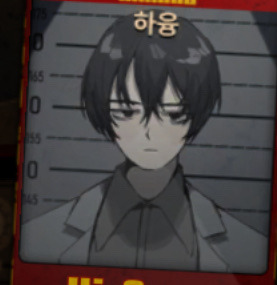
But hold on! I may have an explanation for this difference:
Yes, in the first image, Yi-Sang is not wearing his scientist coat, but he is indeed wearing the gray shirt, and I think Yi-Sang was indeed dressed with his coat initially, I think he just took it off in the left image.
So yes, it sounds like a lame excuse, but look at how Yi-Sang was dressed before this scene (when he was held captive).
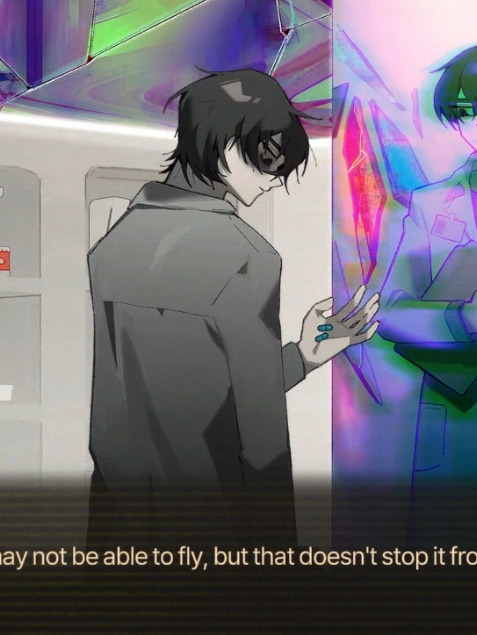
Boom, there it is, that scientist coat. Yi-Sang was indeed dressed as he was in that laboratory when his photo for the company was taken.
But here's the second little hiccup: we don't know how much time separates Yi-Sang's escape and his encounter with Faust...
But if what is depicted behind the sinners is not toward the place/moment where he was recruited by Limbus Company, then I think the place depicted behind the sinner is still a place/moment that shaped the sinner and convinced them to join Limbus Company.
II/ The Paifang
After this brief analysis that raised many questions, I would especially like us to keep the idea that what is depicted behind Hong Lu is related to him and the wing (or other place in the city) where he comes from.
Let's continue:
To make the understanding and analysis of the poster simpler, I decided to divide it into 6 zones:
Red: character
Dark blue: background area with tall buildings —> the city / what is behind the paifang
Purple: Paifang
Light blue: distorted and highly colorful area / portails
Orange: what surrounds the sides of the paifang
Green: the ground and what is in front of the paifang
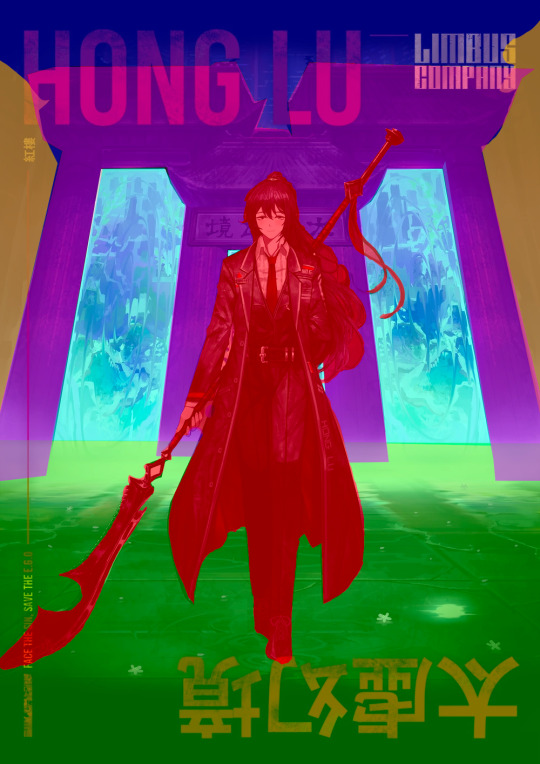
Even if sometimes I won't do it, I will now also use this color code to target specific areas of the poster when needed.
Well, first of all, I'm going to talk about the purple area, which is everything related to the Paifang, which is a very important element of this poster:
This Paifang, which looks like it's made of (red?) wood, seems to be surrounded by tall walls as we can see in the orange area.
So it seems that this Paifang is the only entrance and exit between two spaces. Indeed, if this Paifang is surrounded by walls and (assuming) they extend over a long distance, we can quickly conclude that this passage is the only one that could allow someone to enter or leave a closed space (we will come back to these ideas a little later).
Returning to the Paifang, it seems to perfectly fit the definition I found of a Paifang: "A Paifang is a traditional Chinese architectural structure in the form of a portico or arch, usually placed at the entrance of important places such as cities, temples, or properties. These symbolic gateways are often richly decorated and serve as monumental entry points."
I think the main idea to remember is that this Paifang is a gate/a means of passage, and I think it is the only gate allowing travel between the two spaces it separates.
But what does this gateway separate? Well, I think we have an answer with the inscription in the middle of this Paifang:

Indeed, what is written in the middle behind Hong Lu is this: 境幻虚太 (Jing Huan Xu Tai), we can recognize 4 distinct characters:
境: Realm
幻: Illusory
虚: Void
太: Great
But what is most surprising is that this phrase is actually written backward; indeed, in Chinese, it should be written 太虚幻境 (especially when we know what this combination means, especially in Dream of the Red Chamber), and here it is written as if it had been reflected in a mirror. We know that mirrors play a very important role in Limbus Company, but we will come back to this idea of a mirror a little later.
{Update : I was informed that the ordering of character written on the paifang is actually correct for traditional Chinese writing and for when the characters have to be placed horizontally (especially when you have to write on a space which does not really allow you to write in the vertical like on this paifan). The fact remains that the name of Hong Lu's weapon is therefore written in backward, so why? I don't really have an explanation now... and I have to admit that I still like my first analysis and I still think it is (a little) relevant in a way, so I invit you to keep reading (while keeping this in mind)}
For now, I would like to return to the meaning of what is written on this Paifang; indeed, once the combination of these 4 characters is reversed, it refers to a very important place in Dream of the Red Chamber: "Illusory Land of Great Void" or "Land of Illusion".
We can therefore conclude that this Paifang overlooks the "Land of Illusion" and separates/is the gateway between these two worlds, which are the "Land of Illusion" and, I think, the city.
Which is reminiscent of its “equivalent” in the novel since in the novel there is also a mention of a gate which separates the world of illusions from the rest or at least which indicates its entry point
{Side note: Strangely, this is not the only time that "太虚幻境" appears on the poster since it also appears just at the bottom right, and yes, "Land of Illusion" is also the name of Hong Lu's weapon, but that's not all! It is of course also the name of his EGO.
We can therefore see that the "Land of Illusion" is used to define many things related to or belonging to Hong Lu.}
In the novel Dream of the Red Chamber, The Land of Illusion is a domain where illusions and fantasies come to life. However, despite its enticing and enchanting appearance, this fictional world is also fraught with dangers and traps as it can lead individuals into deceptive illusions and prevent them from perceiving the truth.
However, a very interesting analysis of the Land of Illusion parallels this place with the Prospect Garden, which is the garden where Baoyu lives with his cousins and servants. It is the setting for many events in the novel and is also a haven of peace cut off from the rest of the world where its inhabitants can indulge in their idle and luxurious lives.
When Baoyu first visits this garden, he feels like he has been here before, and indeed, this garden actually reminds Baoyu of the place he visited in his dreams: the Land of Illusion.
A fantastical literary garden devoted to pleasure and love, which recalls the hero's dream of love and evokes in him a sense of the uncanny, will lead the reader to realize that Prospect Garden is the Land of Illusion. Eden, emptied of humanity, may remain a pristine ideal.
The Prospect Garden becomes a Buddhist allegory of experience. It blooms and withers with the ebb and flow of human desires and longings, but it is also a fictional world, imagined, the stuff of dreams.
The Prospect Garden is the earthly manifestation of the Land of Illusion, just as Baoyu is the physical earthly reincarnation of the stone.
III/ Where is Hong Lu?
After discussing what The Land of Illusion is and what this Paifang separated or rather where it leads to, it's time to ask a question: on which side is Hong Lu on his poster?
The Paifang already gives us an indication of this: since we can read "Land of Illusion" backward.
So I think we can deduce that Hong Lu is currently on the side of the "Land of Illusion" because if we follow the theory that the writing on the Paifang is reversed because Hong Lu is in a mirror world, then it's easy to guess that on the other side (the non-visible face) of the Paifang, we could read "The Land of Illusion" written correctly because this Paifang does lead to the "Land of Illusion."
To support this assertion (that Hong Lu is on the side of "The Land of Illusions"), I invite you to look at the dark blue area.
We can see tall buildings bathed in a red/black color; I think this modern aesthetic and these colors are supposed to remind us of the city, whose red color is often associated with —> just look at the map to notice this.
But that's not all: the color red is associated with the red dust by which Buddhism refers to the earthly realm, which contrasts sharply with the luxury brought to mind by the vernacular use of red.
Red dust is a symbol of the impermanence and transience of human life in Chinese philosophy.
It represents the reality of life as transient and ephemeral, reminding individuals that everything in this world is subject to change and disappearance. This notion is often used in Chinese literature and poetry to express the human condition and the importance of fully living each moment, knowing that nothing is permanent.
Red dust is used to talk about our world and our existence on it, which is but a short-lived illusion filled with suffering, to talk about the mundane world.
In Limbus Company, this world of Red Dust, this illusory world, is the city, and this bubbled paradise is "The Land of Illusion."
But how do we know that Hong Lu is indeed walking on the water of what I have been calling "The Land of Illusion" all this time?
Well, a clue might give us the answer; I invite you to look at the green area.
We can see that Hong Lu is walking on water, which already evokes the notion of "reflection" and this idea that The Land of Illusion is a mirrored world of the world of red dust, as is "The Land of Illusion" in the novel, but that's not all.
I will have to step away from Hong Lu's poster for a moment to look at an image present during the Limbus Company launch trailer.

Although nothing I'm about to say has been confirmed, I don't think it's too farfetched to say that we can see in this image a past version of Hong Lu, before he joined the company when he was at home, probably the Jia family manor (or at least its version of LCB).
What's interesting about this image is the color of the sky: this blue fading towards turquoise. We've seen it elsewhere before:

And yes! I am convinced that this blue space we can see in the cutscene of Hong Lu's EGO is supposed to be the sky from his home. And what is Hong Lu's EGO called? Land of Illusion.
Furthermore, I think that this blue sky is meant to contrast with the red sky of the city. Thus, the separation between the two is even more accentuated, as it was with the Paifang that clearly separated the two realities.
So, I believe that we can conclude that Hong Lu lives in the Land of Illusion.
This idea that the world in which Hong Lu lived is "The Land of Illusion" is emphasized by another detail: the reflection of the moon in the water.
In Buddhism, the image of the moon in the water is often used as a metaphor to illustrate the illusory nature of reality or the nature of conditioned existence. This metaphor is often associated with the practice of meditation and understanding the nature of the mind.
The moon in the water appears clearly and distinctly, but it is unstable and transitory, as it is subject to the movements of the water. Similarly, in daily life, what we perceive as reality is often changing, impermanent, and conditioned by multiple factors.
This metaphor thus emphasizes the importance of recognizing the illusory and impermanent nature of reality and not attaching to appearances or transient phenomena. In summary, in Buddhism, the image of the moon in the water is used to illustrate the illusory nature of reality and to encourage the practice of meditation and the search for the true nature of the mind.
I think that this image of the moon in the water is meant to make us understand the true nature of the place where Hong Lu walks: it is The Land Of Illusion, which is nevertheless Hong Lu's reality.
IV/ The Reality of Hong Lu
Indeed, I will now delve into an explanation, and I will try not to get confused. For this, we must now look at a very important excerpt when analyzing the novel Dream of the Red Chamber:
"Truth becomes fiction when the fiction's true; Real becomes not-real when the unreal's real."
This idiom is not just written anywhere in the world of the novel; it is located on the Paifang serving as the border and gateway to the Land of Illusion, and there is a good chance that it is also on the Paifang that we see behind Hong Lu.
This idiom makes us understand that reality is actually fiction and that fiction is actually the real world. It invites us to reverse our perception of realities and to consider what is called "real" as false and what is called “false” as real.
Here, I think, it is about understanding that Hong Lu's reality, which is (in) the Land of Illusions, is actually a fictitious and false world. Where the city, which is an unknown and completely foreign world to Hong Lu, which could be seen by him as a fictional world that is not real, is actually the real world, whereas the world he considers real is (his home) actually a false world.
To be honest, I cheated a bit because even though the reflection of the moon in the water is used to evoke a world of illusion for Buddhism, and even though I think it can indeed refer to the fact that Hong Lu is on the side of the "Land of Illusion", I think above all that this reflection is meant to make us understand that this world where Hong Lu is located has an illusory nature of reality + a nature of conditioned existence.
This brings me to talk again about Prospect Garden, which I think is the place where Hong Lu grew up but is especially the place from which Hong Lu must escape.
Prospect Garden is, as mentioned earlier, the Land of Illusion materialized in the real world and is therefore a domain where illusions and fantasies come to life, that is, a place where Baoyu bathed in luxury and idleness.
In "Dream of the Red Chamber," Jia Baoyu is often faced with symbolic choices between staying in Prospect Garden, which often represents the materialistic world and earthly pleasures, or setting out in search of spiritual enlightenment. His journey to enlightenment often involves leaving the illusions and distractions of the material world represented by Prospect Garden. Thus, it is often suggested that to achieve enlightenment, Jia Baoyu must move away from Prospect Garden and seek a true understanding of himself and the world around him.
At the end of the novel, Jia Baoyu (the figure who is supposed to have inspired Hong Lu) realizes the illusory nature of his life and realizes that Prospect Garden was only a world where he was trapped by the illusory pleasures of life, and that is why at the end Jia Baoyu decides to break with his previous life and leave the garden (as well as the rest of his family).
I think we are going to go to Hong Lu’s home to realise that he was literally living in a bubbled space and we will go to the Land of Illusion which, I think, will also be the Prospect Garden.
And the fact that the words are reverse like if they were reflected in a mirror helps, I think, to support on the idea that Hong Lu's world/reality is a reflection of the real world but where everything is distorted/inverted (a symbol I also think of Hong Lu's ignorance and his strange vision of the world) and that this illusion glass will break little by little
We also have to remember the sentence
"Truth becomes fiction when the fiction's true; Real becomes not-real when the unreal's real.
And remember that what is true is actually false / wrong according to this. So maybe, if this idea from the novel is kept, the world where Hong Lu is living is just a big lie where everything is just a smoke screen and that Hong Lu is living in denial, prefering to accept this illusion so that his world / vision of reality or truth is not shattered.
So, I think that Hong Lu, during his chapter, will have to understand that his reality is not true and learn to leave the land of illusion to find the truth because it seems to me that one of the theme of Hong Lu will turn around the theme of truth and reality.
#limbus company#hong lu lcb#project moon#analysis#theory#SN: I am so hype for Canto VI !!#so let's talk about Hong Lu while everyone else is talking about Heathcliff lol#of course it s just a theory and my interpretation#so I may be wrong or have misunderstood the character or even the book maybe#even if I really tried to do a maximum of research on the subject#Anyway I hope you'd enjoyed it !
80 notes
·
View notes
Text

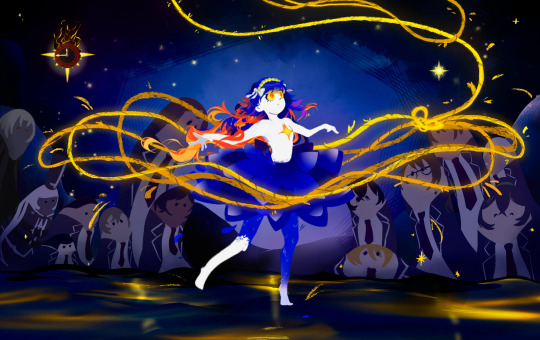
{Compass}
I've been wanting to finish this drawing for a while and I've finally arrived at a decent result, even if the color doesn't look exactly as it should.
As you must have understood, I wanted to reproduce the cover of the song Compass by Mili while using the characters of lcb (maybe (probably) someone already did that)
I would like to take this opportunity at the same time to wish a Joyeux 1er anniversaire, as Meursault might say, at lcb.
In terms of colors. for Ishmael I was mainly inspired by the fan art of @idliketochill , so go see their work!
[Click for better quality]
#limbus company#ishmael lcb#mili#compass#Happy 1rst birthday to lcb!!#dante lcb#faust lcb#yi sang lcb#don quixote lcb#ryoshu lcb#meursault lcb#hong lu lcb#gregor lcb#rodion lcb#outis lcb#sinclair lcl#vergilius lcb#charon lcb#my art#digital art
398 notes
·
View notes
Text
I hope there is going to be a an (attempted) infiltration mission in Canto VI as it has been the case during Canto II or Canto V for example. Just imagining the sinners and Dante trying to infiltrate a ball, it’s just too funny.
I don’t care if they succeed or not in their attempt to infiltrate the place, I just want to see the sinners and Dante dress up in beautiful dresses / suits acting like little gremlins, being so sure that they will be able to infiltrate this ball without being noticed. It would be such a good excuse to have a masked ball.
Of course the running gag would want them to be discovered immediately.
#limbus company#where was I ?#I was just trying to beat the big brother!#it took me so much time I don’t understand#anyway I wanted to come back with something better than a short text#but this idea has been in my head for so long#I had to share it#hoping next time I will be posting a fanart!#rodion lcb#yi sang lcb#hong lu lcb#heathcliff lcb#ishmael lcb#don quixote lcb#gregor lcb#ryoshu lcb#meursault lcb#sinclair lcb#dante lcb#faust lcb#outis lcb#canto VI
30 notes
·
View notes
Text
It’s always funny to me when I have the same reactions as Dante and I never feel closer to them than when I am just playing with my vision of this weird reunion of outcasts as a big and loveable found family, only to see that vision crumbled down and challenged every canto by a sinner or Vergilius who exclaims loud and clear and often vehemently that it will never be anything more than a employer / employee relationship.
At those moments I react exactly like Dante when they are like: « Maybe I am the only one who thought we were sharing something together ? Maybe all the sinners are only here for their own goals ? Maybe they would never want to make an effort to create a meaninful relationship between each others ? Was I a fool to believe that this was the start of a friendship … that we could have developpe a bond more or less deep, a feeling of belonging … that we could have been a family. »
First there is the pain of having your hopes shattered but then that doesn’t stop us to continue hoping for it to happen.
We are just two big delulu people
#limbus company#dante#canto V spoilers#I guess#I mean I know the story is probably going to go on the found family road#but since it’s project moon I can’t help but feel I am being delulu when I am faced with moments like that#because I fear they are just going to put us through suffering#and also maybe because some don't feel worthy to have this sort of relationship again#and that those moments are like a reminder to stay aware of the fact that maybe this is not going to end as a big happy family ...#but that's just a possibility !#there is also the possibility that through this journey they WILL developp this kind of bond#and I mean the best found family are the one where they have to go through stuff together to get there#it's about living things and overcoming together#so I understand why Dante won't stop believing that a deeper relationship can bloom from this#and maybe I am delulu but#for me those moments are just hardships that are on the road which lead to something better and I mean#that's normal since this is a story where characters have to grow and it would be stupid to except the sinners and Dante#to become so close so fast#this is the endgame#and we already have the proof of that possible end with Yi Sang#Yi Sang is ready to create a new kind of bond with Dante and the sinners#he is ready to have what he had once with his previous comrades#because yes the problem is also that all the sinner are hurting deep inside and I have learned that it was better to stay alone#because caring for someone maked them suffered and now they don't want to start a new relationship where they could hurt again#better being alone that being the only one alive and being the one who has to remember and carry on#gosh I ended up talking a lot in the tags#Yi Sang is the best
24 notes
·
View notes
Text
So many things to say regarding the end of this arc of Bungou Stray Dogs but this is what I want to share the most, because I have been saving this for months
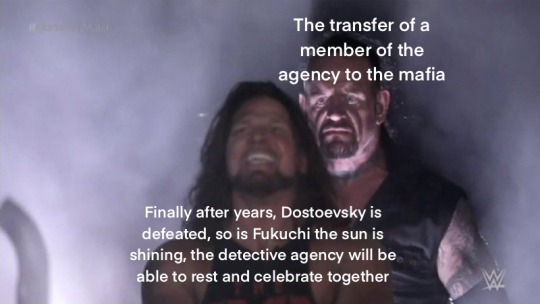
Don't forget, the ride is not over ...
I didn't the anime was going to overtake the manga, I was so surprised but oh boy what a ride to get here, so much pain
#bungou stray dogs#bsd#osamu dazai#chuuya nakahara#fukuzawa#mori ogai#tanizaki junichirou#kunikida doppo#ranpo edogawa#atsushi nakajima#bungou stray dogs season 4 spoilers#bungou stray dogs season 5 spoilers#Bungou stray dogs manga spoilers#I think nobody die ... except on the side of the “bad guys”#or I can't remember#I am bit sad that we didn't loose at least one of the “good” character because it feels like there are no consequences to this#I mean there is consequences on the world and the characters ...#but I would have like to feel that there has been looses and sacrifices to get there even if Fukuchi was doing this for peace#My point is a bit messy maybe I ll re-do it later but I hope you get what I mean
123 notes
·
View notes
Text
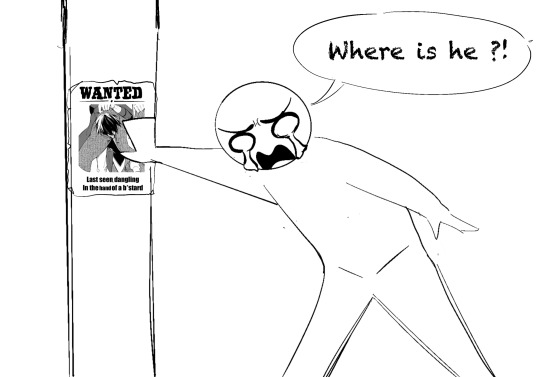
I can’t take this anymore
#bungou stray dogs#bungou stray dogs chapter#ranpo edogawa#look I know everyone is freaking out because of the soukoku situation#and the Sigma situation#but WHERE IS HE#I need to know#I am not asking anymore#tell me what became of Ranpo#just a case#to tell me that he is still alive unconscious on this roof#because I can’t live with this doubt#did Ranpo planned to be knock out by Fukuchi#in order to disappear from the picture and move freely to stop him#or was Poe’s book the only plan B he had#because if yes…Fukuzawa could have come alone#I mean he would have been the more capable one to get closer to Fukuchi in order to trap him#I guess Ranpo was there to be the strategist but come on#Fukuzawa how could you let Ranpo be grab#bungou stray dogs spoilers#I need hope
103 notes
·
View notes
Text
Let’s talk about the end of Canto IV and the identity of Dante
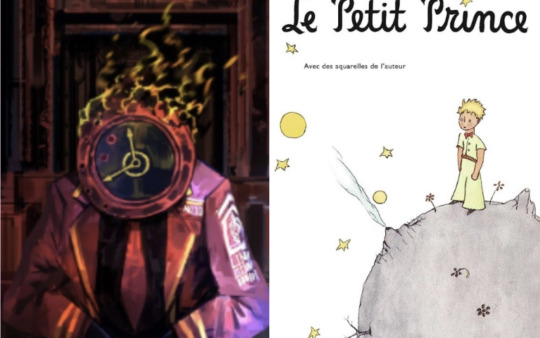
Summary :
-Introduction
1.New perspective on the character of Demian
2. Dante and Saint Exupéry
3.Sinclair and the snake: symbol of his incoming death
4. The stars = people
5. Make connections, find friends
6. But in the end what about the sheep?
At the end of canto IV (which was extraordinary) we were treated to a very interesting little “post credits” scene: Dante and Demian talking together and the latter saying a very interesting sentence:

« Just draw me a sheep later »
This sentence just awakened flashbacks of my high school years because this sentence is of course a reference to one of the most famous sentences of Saint-Exupery's Little Prince. In the “Little Prince”, the character of the same name asks the author, who is also the narrator and a character in the book, to draw him a sheep to protect his rose.
But what does this mean for Dante? It is still too early to come to a conclusion, but we can still look at several elements that this new information could highlight.
1. The character of Demian
Although Demian is, of course, inspired by the character of Demian from the book “Demian” by Herman Hesse, it could be possible that he is also inspired by the character of the Little Prince.
Why?
First, the sentence quoted above is a sentence resembling one that is spoken by the Little Prince in the book, as I said at the beginning. However, this is not the only resemblance between Demian and the Little Prince.
Just in terms of appearance we can see a similarity: the scarf that Demian wears around his neck could be a reference to the Little Prince's scarf which is often represented as floating, like Demian's.

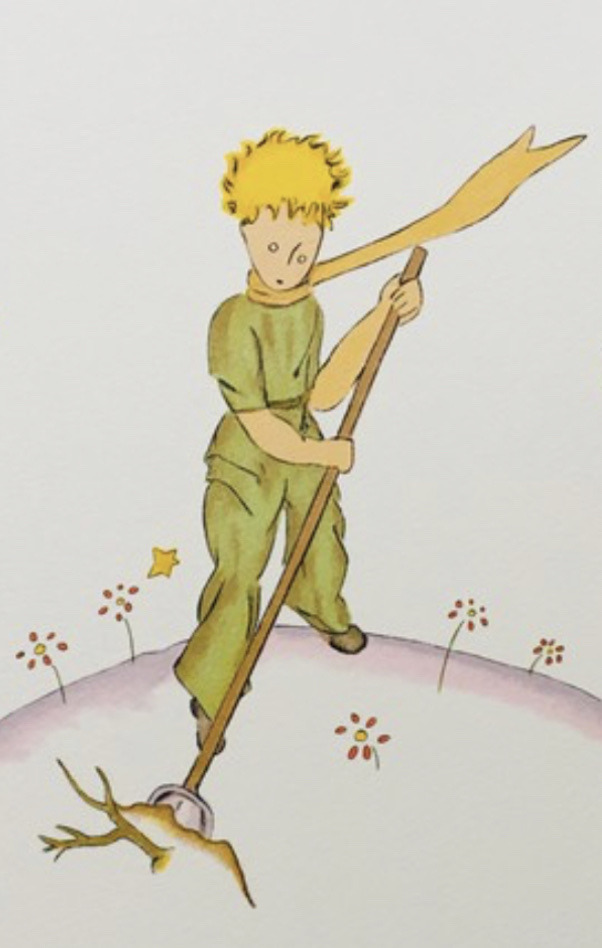
Demian is also related to a character who is related to a snake. I am of course talking about the character of Emil Sinclair where we can see a snake behind him in his image.

Although the snake is mostly a reference to the original sin in Hesse's work, I can't help but think that this snake could also be a reference to the snake of “The Little Prince”.
2.Dante and Saint Exupery
But then if Demian is like the Little Prince and he asks Dante to draw him a sheep, would Dante be inspired by Saint-Exupery? Since it is him who draws a sheep to the Little Prince. Maybe…
It is interesting to note that the interactions between Demian and Dante are very similar to that of the Little Prince and Saint-Exupery:
Demian says cryptic things and responds in the same way to Dante's questions, who remain perplexed in front of him. Sometimes Demian ignores or does not even answer Dante's questions. It's very similar to the many scenes between the author and his blonde-haired friend, one asks many questions while the other responds in a "strange" way or ignores them altogether.
What is interesting is that Saint Exupery is the author and a character of his book which makes him a unique case. Plus it should remind you of someone: Dante from “The Divine Comedy”.
Where the other 12 sinners are either inspired by a character or the author of their respective works, they are never inspired by someone who is both.
Only Dante find themself in this case.
Another element supports this theory linking “The Little Prince” to Dante: the sentence they said to Sinclair when the latter was about to join Kromer:


These sentences are, I’m sure, a reference to a famous quote of another very important character in “The Little Prince”: the Fox
« Here is my secret. It is very simple: we only see well with the heart. What is essential is invisible to the eye. »
The fox explains that the true perception and understanding of things is not done through the eyes, but with the heart. He emphasizes that the very essence of things, their true value and beauty, can only be perceived by having an inner vision, an emotional connection.
But then, Dante would be the Fox?
As you can see I am more of the opinion that Dante are inspired by the author and not by the Fox but then why do they pronounce words belonging to the Fox. Well I think Dante said the fox’s words because they remembered them unconsciously because it was a moral that touched the narrator in “The Little Prince” and could have touched them in the same way. The Fox could belong to Dante’s past.
This would be why, I think, Demian repeats these words before intervening against Kromer, he recognised them.
3.Sinclair and the snake? A symbol of his incoming death?
A brief parenthesis on Sinclair. Demian says a very enigmatic sentence to Dante regarding Sinclair:
“When he becomes one with beautiful stars…”
Although I think this phrase refers to the fact that when Sinclair will able to see entirely with his heart and not his eyes, then he will "be one with the stars" I also have another interpretation.
This turn of phrase strongly reminds me of a passage from the book (WARNING! SPOILERS REGARDING THE END OF THE LITTLE PRINCE):
At the end of the book the little prince dies from the bite of the snake, thus leaving his body and now able to join B612 — his star. At that moment, the little prince joined the stars and "became" his star.
In the book it is mentioned that when a person dies they become a star in the sky. This suggests an idea of continuity and eternal presence beyond earthly life.
This supports the idea that the stars represent each existing individual but also that the stars symbolize the immortality of the soul.
So Sinclair should become a star and one with all the others by dying? Does this sentence announce his death?
Small additional detail: Sinclair strangely resembles the Little Prince from the little we know about him. The only physical detail we have of the Little Prince is that he looks like a child and has wheat-blonde hair.

So yes, blond hair is not the ultimate proof that Sinclair would also be linked to “The Little Prince” because it is not difficult to meet this criterion, as a proof Don Quixote could also very well correspond. But taking into account that Sinclair is already linked with Demian and has an element that distinguishes him from other sinners: the mark of Cain + these mysterious similarities between him and “The Little Prince”, it was worth mentioning.
Additionally, Sinclair is associated with the color green; the color that is often associated with the Little Prince because of his clothes. And the color green used for Sinclair is named: immature green, although this could be a reference to Sinclair's egg, hatching, self-development theme associated with Demian, why not considering that "immature" is a reference to the character of the Little Prince who can be seen as immature because he does not sound like an adult and behaves like a child even in the face of serious situations.
I think it's worth looking into.
Also I thinh that this "theory" could also highlight a moment of Hell Chicken: I'm talking about when Sinclair's team (Faust and Outis in particular) comment on Sinclair's height and the various reasons why Sinclair isn't likely to grow taller than that. This comment about Sinclair's height implying that Sinclair remains small even for his age could be a clue to his connection to the Little Prince by making him look like "a child"
4. The stars
I would now like to address the theme of the stars, which is a very important element in the book as in Limbus Company, as Canto IV was able to confirm.
For the Little Prince, the stars are more than just bright spots in the sky. They symbolize the infinite and the inaccessible, awakening in him a feeling of wonder and escape. They offer him a sense of connection with something greater than himself, transporting him beyond.
If we want to connect the phrase "seeing with the heart rather than the eyes" and the stars, we can mention this passage:
The Little Prince observes the stars and says: "All these stars are mine. To me alone. They make me laugh every time I think about them."
It shows how the Little Prince finds meaning and a deep connection with the stars by seeing them with his heart, which allows him to feel joy and wonder. Strangely this is exactly what we saw in Canto IV, and at the same time its exact opposite.
When we were talking about the tale and the "tearful star" singularity, we could see that the stars were also seen as a symbol of hope and joy in the Limbus’ world as is the case for the Little Prince. However, K corp's singularity does the exact opposite of what the stars are for in The Little Prince: it cries in their place. Where the stars of “The Little Prince” are associated with joy, here it is associated with sadness. But is this really the case?
In truth, this star could also be seen as a mean to bring joy or at least to prevent people from feeling sadness by crying for them. This star would therefore be similar to the stars of the Little Prince in this sense.
However in "The Little Prince", the stars can also be interpreted as representing people in a metaphorical way. The Little Prince encounters various stars throughout his journey, and each of them is home to a unique person. It can be seen as a representation of the individuals he meets in his life.
By focusing on the stars, Saint-Exupéry emphasizes the importance of human diversity and individuality. Each star and each person has an intrinsic value and contributes to the richness of the universe. The Little Prince himself learns to appreciate the uniqueness of each star, just as he learns to understand and love the different people he meets. This is something Dante are doing: they are learning to know the different sinners (and people) and to appreciate their uniqueness.
Each star, although distant and distinct, has a certain importance and its own identity. In the same way, each person we meet in our own existence is unique, with their own experiences, emotions and perspectives. Which is, I think, a very underlined subject in Limbus Company and that’s not all:
“I wonder,” he said, “if the stars are lit so that everyone can one day find their own.”
For Saint-Exupéry, the object of the quest, the star, is closely linked to the personality and experience of each of us.
“People have stars that are not the same.”
Guides, little lights, problems, precious metal… depending on whether you are a pilot, spectator, scientist or businessman. But for a star to become ours, for the Truth to make mystery beautiful as the invisible rose makes the star beautiful, it must become the seat of our most personal desire, the receptacle of our hopes and of our memories.
To inhabit our star with a meaning that is unique to us, to make it different and to be able to evoke it in the darkest night, it is essential to seek to know oneself with determination, like the Little Prince who "does not never gave up on a question once he had asked it.”
Knowing how to take the time to explore, to step aside “Straight ahead, you can’t go very far.” to be able to assess yourself.
This work on oneself to populate a star with one's hopes is not done without pain. It can bring more disappointment than pride and lead us, like the Little Prince, to cry over the banality of our character:
“I thought I was rich in a unique flower, and I only have an ordinary rose (...) it doesn’t make me a very great prince. And lying in the grass, he cried. That’s when the fox appeared.”
I find this process of acceptance and self-discovery reminiscent of Limbus Company's notion of E.G.O and Fathom of the E.G.O where each sinner learns to make peace with a part of themselves and break the cycle. He doesn't have to reject a part of himself or keep only the "good" in him. He learns to accept it and live with it to make it a source of light for his star, even if it sometimes has to go through a difficult acceptance of a truth or trying trials.
5. Make connections, find friends
I wonder if the notion of « taming » will be mentioned in Limbus Company?
The word « taming » does not have the same meaning as what we might give it on a daily basis.
When the fox explains to the Little Prince what « taming » means, he says to him:
"It's something too forgotten, says the fox. It means creating links..."
Taming represents a process where one establishes a deep emotional connection with someone or something, and it is through this heart connection that one can truly see and understand.
The fox explains to the Little Prince the importance of taming, which involves investing time, attention and affection in creating deep and meaningful bonds with others.
The fox also emphasizes the responsibility that comes with taming by saying,
"You become responsible forever for what you have tamed."
The fox explains to the little prince that when you tame someone or something, you become responsible for this relationship. It emphasizes the importance of caring for those you love and cultivating lasting bonds.
Furthermore in "The Little Prince", the themes of loneliness and friendship take center stage.
The Little Prince often feels lonely during his interplanetary travels, as he is the only one of his kind and finds himself far from his planet and his beloved rose. However, as he encounters various characters, he discovers friendship and the power of human connection.
It is in particular thanks to his friendship with the fox that he understands the importance of emotional ties and the need to bond with others.
The book thus explores loneliness as a universal experience, while emphasizing the vital importance of friendship and human relationships in filling this feeling of emptiness. It reminds us that deep and sincere connections with others are essential for our growth and our understanding of the world around us.
So I may be a blind optimist but I feel like this idea fits well with Dante and the bus members:
Even if it's complicated and there's still a long way to go, each member of the bus are becoming close and are developping a bond that could be seen as a form of friendship. And after all as the fox said; it takes time, affection and attention to create this special bond. Every day Dante can sit a little closer to each Sinners respecting their rhythm as the little prince did for the fox.
However, this would mean that Dante could start to feel a sense of responsibility that accompanies the birth of this bond.
In fact, Dante already feels this responsibility but they associate it with their role as a manager who must guide their employees. However I think that Dante could soon see this feeling of responsibility as a feeling that accompanies what they have "tamed" and thus realize that it is not because they are a manager that they feel the need to take care of the Sinners but indeed because a lasting bond is borned between them.
6. But in the end, what about the sheep?
The sheep represents desire / expectations and creativity.
The metaphor of drawing according to Saint-Exupery tells us that, forced to live in a world of realism, we fail to guess and describe this Truth that attracts us: his attempts to realistically draw a sheep fail to satisfy the Little Prince’s desire.
The Little Prince does not only want a sheep, he wants a sheep capable of protecting his rose by eating the trees. Under the surface of this drawing hides the object of the Little Prince’s desire and therefore of our existence as he says in Chapter IV, strange when we know that Demian also asks us for a sheep in Canto IV
“When you want a sheep, it’s proof that you exist”
Would Demian then ask Dante to give him a solution to his problem of realizing his desire? Is this “Truth” linked to the quest of Dante regarding their memories, an attempt to regain the Truth and in a sense gaining back their existence?
The sheep could also be linked to the sacrificial lamb in the Bible, I don’t really know where this information could take us but since the sacred texts are at the core of Project moon’s works it’s always good to mention. Furthermore, the other common point between the Bible and “The Little Prince” is the fact that The Bible is the most translated book in the world but “The Little Prince” is the second one.
#limbus company#project moon#dante#dante limbus company#demian#demian limbus company#emil sinclair#sinclair#Sinclair Limbus company#The Little Prince#This is a theory / essay#Canto IV#Canto IV spoilers for the end
207 notes
·
View notes
Text
Canto IV part 3 spoilers.
I just finished Chapter IV and my god what an emotional journey, I think this is my favorite Canto so far. I'm still so emotional that I need to share the details that stood out to me the most or touched me the most:
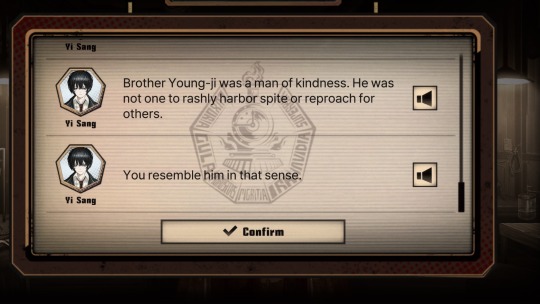
Something else; I'm sure the role each sinner held in Yi Sang's memories was not a coincidence, kind of as if depending on each sinner's affinity; the most appropriate role had been assigned to them and therefore a lot of things to analyze if this is the case.
I didn't think I was going to see or needed the Hong Lu / Yi Sang friendship but my god their interactions were so cute and touching I really liked this development between the two. The ending image was really the cherry on the cake when I saw that Hong Lu was the one who came to keep Yi Sang company. In short, I love their friendships and I can't help but think of this very funny meme that illustrated the two visions of nihilism using the characters lmao, two opposites that attract each other. Wholesome.
This is why I immediately want to emphasize the role of Outis in the memories: she was not the traitor in Yi Sang's memories since Dongrang was there and therefore played his role, but I still find it suspicious that 'she was the only one of the sinners (apart from Yi Sang but these are his memories) to have dialogue when the traitor is revealed.
The final boss song is just extraordinary, not to mention the OST which was just to die for but the end song! Mili has really surpassed herself.
I HATE Gubo because even though he "protected" (and again this is a big word) Yi Sang and seems to care about him, I only see that as manipulation and a way to exploit Yi Sang by taking advantage of his unstable mental state for his own benefit. Worst of all he locked Yi Sang up to work while putting him on drugs. It's really awful.
Speaking of the captivity and role of Yi Sang I can’t help but think that Yi Sang and Yosano from Bungou Stray Dogs look alike — in the sense that they are born prodigies (Yi Sang because of his genius and Yosano because of her gift) who have been exploited for their talent and kept at one point in a white room)
Speaking of genius I wonder if the lyrics in the song Lament “If you wanted me to carry on our dreams. Why’d you curse me with “you’re a natural born genius” refers directly to Yi Sang? Because it fits him so much.
But fortunately Yi Sang has found a new home. And oh boy I smile so much when Yi Sang admitted the bus and the Sinners were his new home and mates. It’s so touching seeing that Yi Sang walked without goal in mind or a place to return to, he just walked until he finds a new place where to belong and it happens to be the bus I am so emotional right now because it’s screaming found family and I love that!
In Conclusion awesome Canto I can’t wait for the next one!
Side note: Rodya, Don and Sinclair are so cute together on the end credit image! She looks so much like their mom.
+ I am sorry but at the end Dante is such a parent commenting on how the sinners are eating.
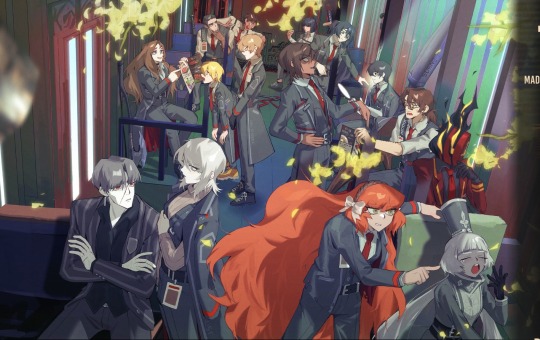
#limbus company#limbus company spoilers#Yi Sang#Yi Sang limbus company#rambling#canto IV#Gubo#Outis#dante lcb#Mili#Project moon
34 notes
·
View notes
Text

{Tired naivety}
*manifesting Hong Lu’s past*
There is no doubt in my mind that behind all this cheerfulness is hidden a horrible backstory.
#limbus company#hong lu limbus company#digital art#fan art#my art#project moon#young Hong Lu#tw: abuse#tw: reference to abuse#click for better quality#discovering that Hong Lu's hair was not done in a ponytail but in a Half up ponytail was the biggest revelation of my week#inking#I prefered the sketch but it’s always hard to make a perfect lineart
27 notes
·
View notes
Text
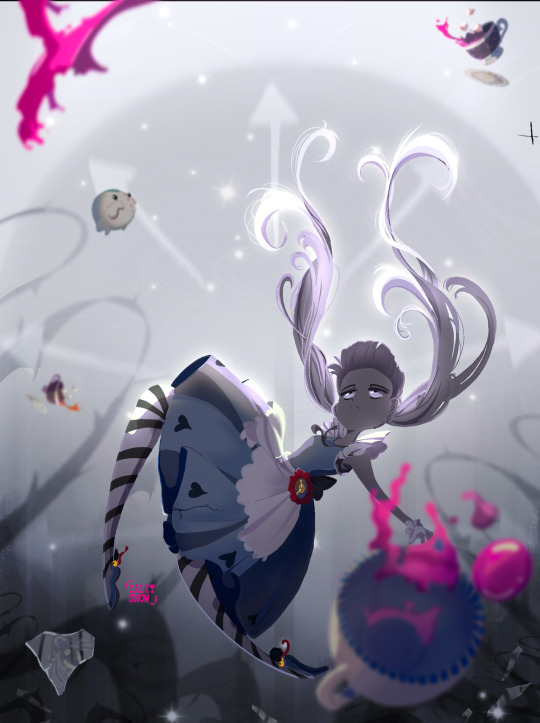
{Charon in Wonderland!}
Click for better quality
#limbus company#project moon#charon#lapis#my art#fan art#digital art#project moon charon#wonderlab references#will you spot them all ??
147 notes
·
View notes
Text
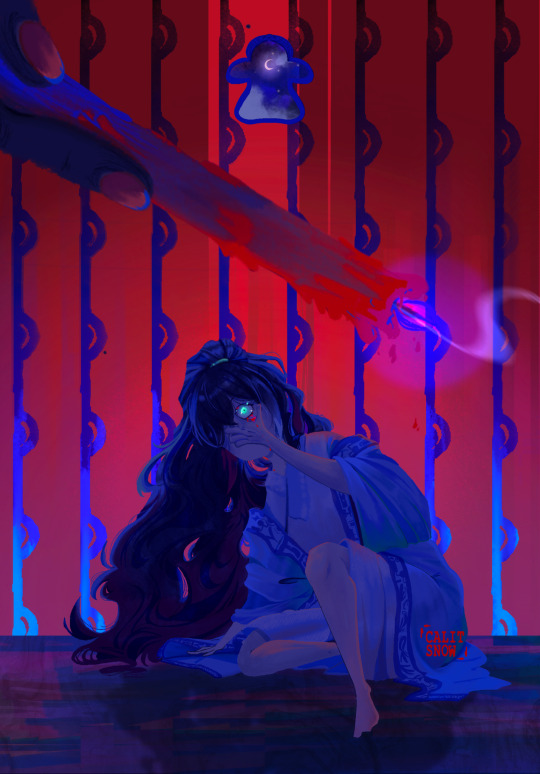
{Family ?}
I wanted to make some changes to the background (less blue more red) of my last drawing, nothing extraordinary but I still wanted to share this version
Click for better quality
#limbus company#Hong Lu#dream of the red chamber#project moon#my art#digital art#new version of an old art#fan art#hong lu limbus company#eye horror#well it looks like blood but it is wax#which is also bad ...#Jia Huan#well Jia Huan's hand#I'm excited for Hong Lu's backstory and scared at the same time#yes it's a reference to THAT scene in the book
146 notes
·
View notes
Text
Everyone pointed out that Kromer is staggered if you brought N-Corp Sinclair to fight her (which is such a neat detail) but I also want to point out that when N-Corp Faust uses the "whistles" passive skill, N-Corp Sinclair laughs and that laugh breaks my heart.
#limbus company#faust limbus company#sinclair limbus#project moon#N-corp Sinclair#kromer#I don't think it affects his sanity#but it is this attention to detail that is so satisfying
189 notes
·
View notes
Text
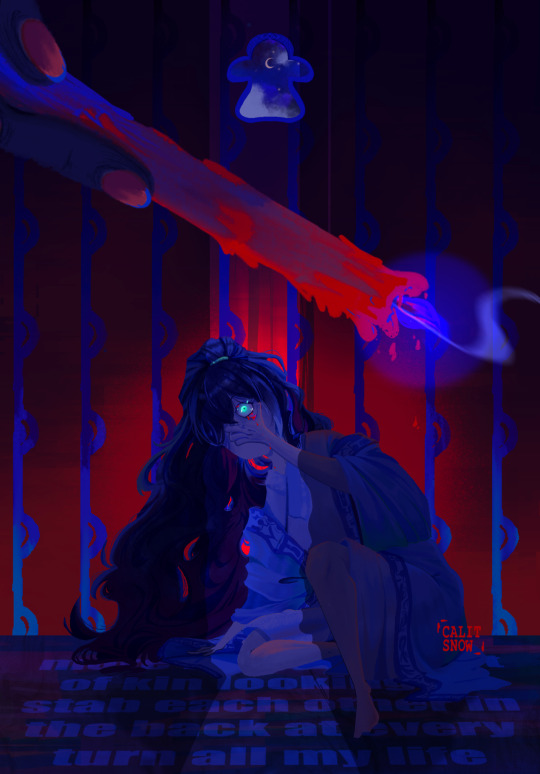
{Family ?}
Click for better quality
#limbus company#hong lu#project moon#my art#digital art#fan art#dream of the red chamber#I want the backstory of Hong Lu#jia huan#well Jia Huan's hand#artists on tumblr#I swear the quality is better when you click#LBP#do not worry it is not blood only wax#oh wait#that’s not good either#eye horror#?
91 notes
·
View notes
Text
I was finally able to see the final of The Owl House and what to say except that it was epic, a unique experience and that I will miss all these characters (especially you Raine). To make the release of episode 3, my sister wanted to make a special AMV, even if she finished a little after the initial date. In short, enjoy :)
youtube
#the owl house#the owl house season 2#amv the owl house#spoilers the owl house#only for season 2 and the trailers#luz nocera#eda clawthorne#raine whispers#disney#dana terrace#thank you for everything#watching and dreaming#amity blight#hunter#the owl house willow#Youtube
4 notes
·
View notes
Text
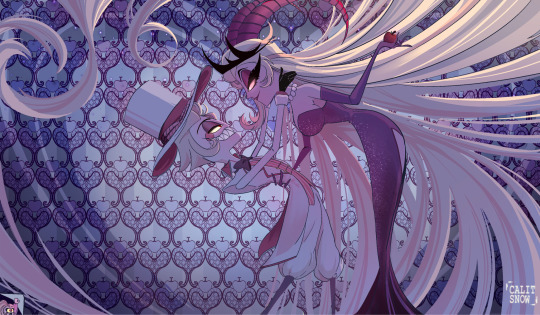
{Temptation}
As always click for better quality
#hazbin hotel#lucifer morningstar#lilith#lilith morningstar#lucifer magne#lilith magne#hazbin hotel lucifer#hazbin hotel lilith#charlie morningstar#charlie magne#hazbin hotel charlie#my art#fan art#digital art#vivziepop#A24#can't wait to see this power couple in action#I wanted a Morticia and Gomez Addams vibe#lilith x lucifer#art
534 notes
·
View notes